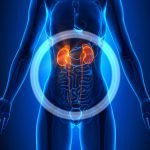 Kidney Disease is a serious and progressive disease. The kidneys are two bean shaped organs that are located just below the rib cage. They are part of the body’s Urinary Tract, which also includes the bladder. They have several functions within the body. They filter the blood, removing wastes and extra water sending it to the bladder in the form of urine. They remove metabolic waste that is created by other cells of the body. Removing the metabolic waste ensures a homeostasis balance of water, salts, and minerals. The kidneys also produce hormones that talk to other organs. Some of these hormones help to do things like control your blood pressure, make red blood cells, and promote bone health.
Kidney Disease is a serious and progressive disease. The kidneys are two bean shaped organs that are located just below the rib cage. They are part of the body’s Urinary Tract, which also includes the bladder. They have several functions within the body. They filter the blood, removing wastes and extra water sending it to the bladder in the form of urine. They remove metabolic waste that is created by other cells of the body. Removing the metabolic waste ensures a homeostasis balance of water, salts, and minerals. The kidneys also produce hormones that talk to other organs. Some of these hormones help to do things like control your blood pressure, make red blood cells, and promote bone health.
So, your kidneys are very important. As a home health agency, we sometimes treat patients with kidney disease. The disease is usually caused by other health problems that have permanently damaged the kidneys slowly over time. The most common health problems that lead to kidney disease and failure are diabetes and high blood pressure. There are 5 stages of Chronic Kidney Disease. The different stages are determined using the Estimated Glomerular Filtration Rate (eGFR.) The eGFR is calculate by testing a patient’s blood for creatinine. The lower the eGFR, the more advanced the kidney disease.
Stage 1 is an eGFR of 90 or greater. In Stage 1, the kidneys are usually healthy and working well, but there are subtle signs of damage. Some signs might include physical damage to the kidneys or protein in the urine.
Stage 2 is an eGFR of 60 to 89. In Stage 2, the kidneys are usually health and working well, but there are more noticeable signs of damage. These signs can be the same as in Stage 1, but to a more severe degree.
Stage 3 is an eGFR of 30 to 59. Furthermore, Stage 3 is broken down into two sub-stages. Stage 3a is an eGFR of 45 to 59, and Stage 3b is eGFR of 30 to 44. Stage 3 is when patients start to experience complications of kidney disease like high blood pressure and bone disease with anemia. Urine can also contain blood leading it to be discolored.
Stage 4 is an eGFR of 15 to 30. In stage 4, the kidneys are reasonably to severely damaged. Stage 4 is very serious and should not be taken lightly. With stage 4, patients will experience all the symptoms of the first 3 stages with swelling in the hands and feet, back pain, erratic urination, and cardiovascular complications. It is very likely that kidney dialysis or a kidney transplant will be needed.
Stage 5 is an eGFR of less than 15. Stage 5 or End Stage Renal Disease (ESRD) is the final stage of kidney disease, and the kidneys are very close to failure or have failed. At this point, the body can no longer filter out waste. The only options are kidney dialysis or a kidney transplant.
Kidney disease cannot be reversed. If you have been diagnosed with the disease, it is important that you see a Nephrologist. Nephrologists are doctors who specialize in kidney disease. You cannot reverse the disease, but you can make life changes that stop or slow down the progression. Some of the things you can do are to change your diet, stop smoking, maintain a healthy weight, control your blood pressure. If you have diabetes, you need to make sure you have your blood sugar under control. As a home health agency, we can help patients with kidney disease if they meet the home health certification requirements of their insurance. Kidney disease is serious and should be taken seriously. For more information about kidney disease, please visit: More information about kidney disease
Recent Comments